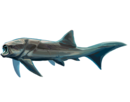
Arthrodira is an order of extinct armored, jawed fishes of the class Placodermi that flourished in the Devonian period before their sudden extinction, surviving for about 50 million years and penetrating most marine ecological niches. Arthrodires were the largest and most diverse of all groups of placoderms.
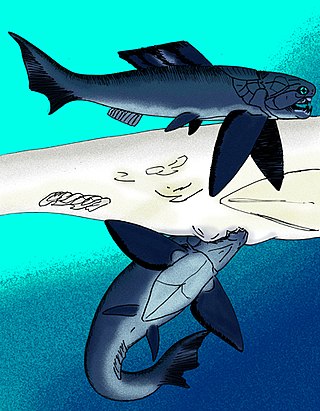
Dinichthys is an extinct monospecific genus of large marine arthrodire placoderm from the Late Devonian measuring around 3 metres (9.8 ft) long. Fossils were recovered from the Ohio Shale Formation along the Olentangy River in Delaware County, Ohio.

Arctolepis is an extinct genus of placoderm arthrodire fish which lived during the Early Devonian period. Fossils of Arctolepis have been found in what is now Norway and Michigan.

Phlyctaeniidae is an extinct family of placoderm arthrodire fishes that lived during the Devonian period, mainly in Norway and North America.

Dicksonosteus is an extinct genus of basal arthrodire placoderm fish which lived during the Early Devonian period of Spitsbergen, Norway.

Aleosteus is an extinct monospecific genus of arthrodire placoderm fish of the Early Devonian period. The type species Aleosteus eganensis was described in 2000, and was found in the Late Emsian strate of the Sevy Dolomite Formation, in the Egan Range of east-central Nevada, USA. Almost complete fossils belong to juvenile and adult specimens and show a short and broad skull, posteriorly concave.

Wuttagoonaspidae is a family of extinct primitive arthrodire placoderm fishes from Early Devonian China and Middle Devonian Australia. It contains two genera, Wuttagoonaspis and Yiminaspis, some of the more basal members of the order Arthrodira, as shown in the cladogram below:

Wuttagoonaspis is an extinct genus of primitive arthrodire placoderm fish from the Middle Devonian of Australia. The box-like skull is up to 18 centimeters in length, and the median dorsal plate averages in length about 10 centimeters. It contains two species: the type species Wuttagoonaspis fletcheri, described by Ritchie in 1973, and Wuttagoonaspis milligani, described by Young and Goujet in 2003.
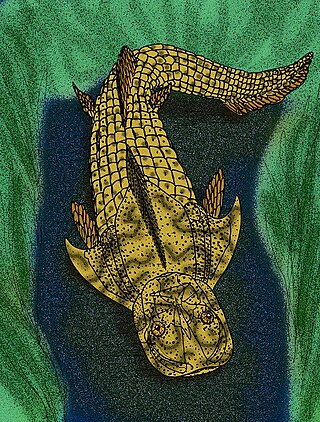
Yiminaspis is an extinct monospecific genus of primitive arthrodire placoderm fish from Emsian-aged marine strata in Yunnan, China. The type species Yiminaspis shenme was named and described in 2008, and is known from a flattened partial skull and portions of the thoracic armor.
Yujiangolepis is an extinct monospecific genus of arthrodire placoderm fish from the Pragian stage of the Devonian period. The type species is Yujiangolepis liujingensis, described from a single incomplete skull roof from the Nakaoling (Nagaoling) Formation of Hengxian, Guangxi, South China. It is one of the more basal members of the order Arthrodira, closely related to Antarctaspis, as shown in the cladogram below:
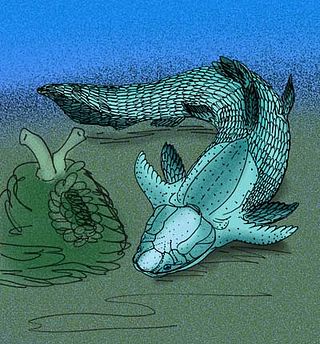
Antarctaspis is an extinct monospecific genus of arthrodire placoderm fish which existed in Antarctica during the Givetian age of the Devonian period. The type species Antarctaspis mcmurdoensis was described White in 1968, and is known from a partial head shield discovered in the Lashly Mountains of Antarctica. It is one of the more basal members of the order Arthrodira, closely related to Yujiangolepis, as shown in the cladogram below:
Aethaspis is an extinct genus of arthrodire placoderm fish from the Devonian period. Two species were described by Denison in 1958: Aethapsis major and Aethapsis utahensis. It is one of the more basal members of the order Arthrodira, as shown in the cladogram below:
Lehmanosteus is an extinct monospecific genus of arthrodire placoderm fish, named after French paleontologist Jean-Pierre Lehman. The type species Lehmanosteus hyperboreus was described in 1984, and was found in Early Devonian strata of the Wood Bay Formation on the island of Spitsbergen, Svalbard in Norway.
Simblaspis is an extinct monospecific genus of arthrodire placoderm fish of the Early Devonian period. The type species Aleosteus eganensis was described in 1958, and was found in Pragian strata of the Qasr Limestone in Saudi Arabia.
Heightingtonaspis is an extinct genus of primitive arthrodire placoderm fish from the Devonian period in Great Britain, and currently contains three species.
Anarthraspis is an extinct genus of arthrodire placoderm fishes which lived during the Early Devonian period. It contains two species described in 1932, Anarthraspis chamberlini and Anarthraspis montanus, both found in the Beartooth Butte Formation of Wyoming and Montana, USA, and assigned to the genus in 1934.
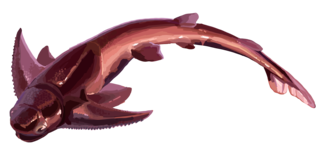
Kujdanowiaspis is an extinct genus of arthrodire placoderm fish from the Early Devonian of Podolia (Ukraine), Poland and Spain. Kujdanowiaspis is known from many fragmentary head shields and body armours.

Pachyosteomorphi is an extinct clade of arthrodire placoderms within the Eubrachythoraci, armored fish most diverse during the Devonian. Most are considered to be pelagic long-distance swimmers, leading to their widespread distribution beginning from at least the Middle Devonian period.
Panxiosteus is an extinct monospecific genus of placoderm arthrodire from the Middle Devonian: Givetian stage of Yunnan province, China.

Coccosteomorphi is an extinct clade of arthrodire placoderms within the Eubrachythoraci, armored fish most diverse during the Devonian. Most are considered to be pelagic long-distance swimmers, leading to their widespread distribution beginning from at least the Middle Devonian period.



















